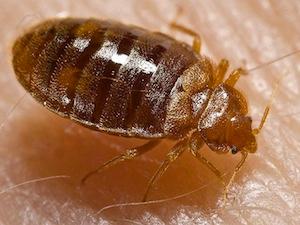Bed bugs: Entomological terrorists
Image of a bed bug.
This story was originally covered by PRI’s The Takeaway. For more, listen to the audio above.
On Friday, February 1, the Georgetown University Hotel in Washington DC was overrun by insect enthusiasts. The hotel was the site of the second National Bed Bug Summit. The theme of this year’s convention was: “Advancing Towards Solutions to the Bed Bug Problem.” Topics on the agenda included “Researching Bed Bugs: What’s Known and What’s Next” and “Non-Chemical Interventions and Do-it-yourself Approaches.”
As opposed to the first summit, which took place in 2009, this year’s event focused on “a lot more dialogue between those people who work on bed bugs and the people who are affected,” according to Lou Sorkin, an entomologist from the American Museum of Natural History.
Though people have known about the problems with bed bugs for decades, they haven’t gone away in part because they’re so hard to treat. Sorkin told PRI’s The Takeaway: “People are used to just calling someone in and saying, ‘well spray something and get rid of it.'” That doesn’t always work with bed bugs, according to Sorkin, “because of the behavior of this insect, it gets so enmeshed in your home or in offices or in other places.”
There’s still a lot that scientists don’t know about bed bugs, according to Sorkin. At the same time, treatments have been getting much better. People have started collecting genetic information and more specialized treatments. Sorkin says “we have a lot more in our arsenal.”
“One of the problems has been the public awareness and the public education,” Sorkin told The Takeaway. The specific species of bed bug that’s currently terrorizing much of New York City, Cimex lectularius, was a big problem in the 50s. Then it disappeared from public discussion. “So people sort of forgot about it,” Sorkin says, “and it sort of snuck up on everyone, basically.”
The current bed bug situation is “almost like a terrorist,” according to Sorkin, “you weren’t ready for it until something happened, and then you started looking out.”
“The Takeaway” is a national morning news program, delivering the news and analysis you need to catch up, start your day, and prepare for what’s ahead. The show is a co-production of WNYC and PRI, in editorial collaboration with the BBC, The New York Times Radio, and WGBH.
